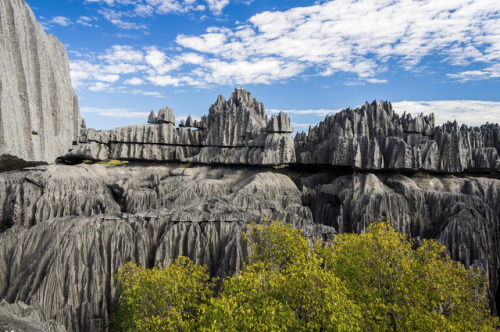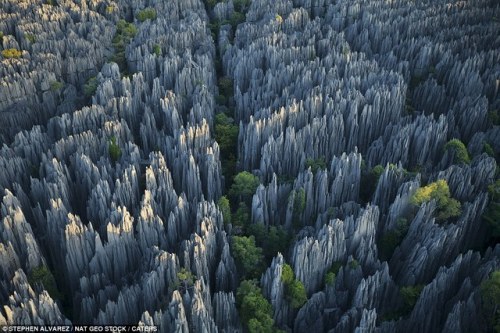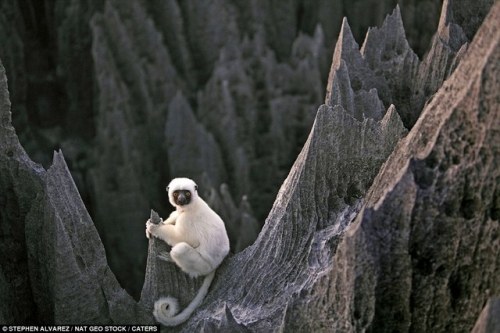gorgeousgeology: naturallyaspirated: gorgeousgeology: naturallyaspirated: gorgeousgeology: Madagasca
gorgeousgeology: naturallyaspirated: gorgeousgeology: naturallyaspirated: gorgeousgeology: Madagascar, Tsingy. These knife-like limestone formations stretch over 70 meters into the air. Known as The Forest Of Knives, these razor-sharp limestone points can slice through equipment and flesh easily, which makes traversing them extremely difficult and dangerous, some climbers have been known to get through over 15 pairs of boots! It is estimated that the Tsingy has the largest underground cave system in the world and many animals live among the endless maze of disorienting corridors, humid caves, and unforgiving razors at the ground level.(Image one credit: Pierre-Yves Babelon) WHOA!!! Yeah it’s pretty sweet and for anyone who is about to ask, it’s a Sifaka lemur! Tsingy is formed by mildly acidic rainwater dissolving into the softer strata of limestone from above, and carved it out from underneath, eroding the solid rock both vertically and horizontally, and wearing it away on every surface to a sponge-like, porous honeycomb of limestone cells. So many of you are probably thinking “Wow I’d love to go and climb around it” and yeah I don’t blame you, it looks amazing. The Tsingy are located in the ANKARA geographic park. However it’s also incredibly dangerous, due to the fact that those spires are literally razor-sharp. Seriously, most of the park is completely unexplored because it’s so dangerous and you will burn through shoes like anything. It’s not something to just have a walk around, it’s genuinely a feat. GEEZ!!! That’s amazing!! Is it because it’s porous/spongy that it can support those large overhangs? Also, I assume that the tops of the ridges are sharp, but is it also razor sharp down the sides where it’s porous? I imagine it has something to do with it as well as lucky balance. In Malagasy (the native language), the word tsingy means “where one cannot walk barefoot.” Tsingy formations started about 200 million years ago when a bed of porous limestone was deposited in a lagoon. Over time the land was lifted up and sea levels began to fall as well which exposed the limestone bed that had been protected under the salt water of the lagoon. After it was exposed, fresh ground water started the chemical erosion process that formed caves about 1.8 million years ago. The calcium carbonate in limestone dissolves easily in the presence of water so the fault lines from the plate tectonic uplift were the first to erode and begin this amazing transformation. I’ll be honest though, that’s about the full extent of my knowledge when it comes to the Tsingy. They’re cool as fuck though! -- source link
Tumblr Blog : gorgeousgeology.tumblr.com


